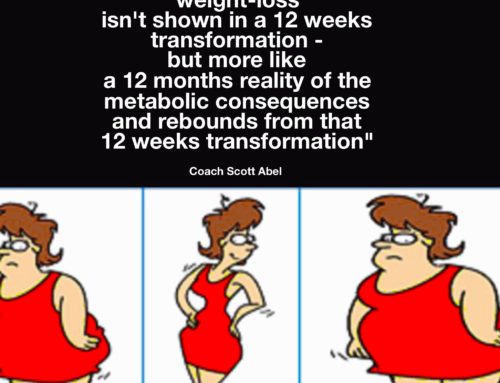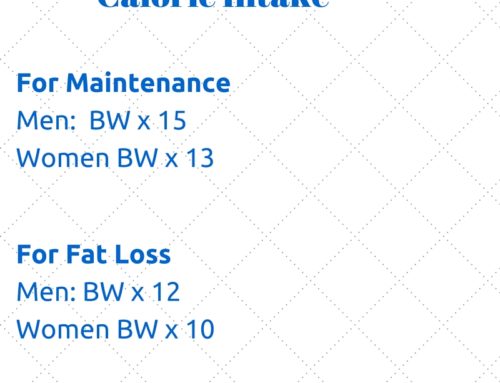You may have seen the New York Times article that talks about what happened to contestants after they left the Biggest Loser. Nearly all of the contestants regained the weight and some are even heavier now.
The typical response would be, “Of course they did. They probably started eating junk again and aren’t working out 8 hours per day like they did on the show. It’s just because they didn’t want it bad enough or have enough willpower.”
Slower Metabolisms
As I’ve told you, when you lose weight you burn less calories. The article says that when the people started the show their metabolisms were normal. AFTER the show their metabolisms have slowed radically and their bodies were not burning enough calories to maintain their thinner sizes.
One of the gentlemen in the story weighs 295 pounds and he says he has to eat 800 calories less than a typical man his size. If he eats more, then he gains fat. Other people report drinking 1-2 beers and piling on 20 pounds.
They aren’t exaggerating. It has been One Year since I stopped restrictive dieting and exercise and in that one year, I have gained weight every single month. I am now nearly 30 pounds heavier than when I even started the goal of trying to compete in Figure.
Like everyone else I blamed myself for lack of willpower and maybe I need to try this plan or that….UNTIL I started researching and understanding what was happening. I wrote a blog post about my journey that I Will share at the end of this e-mail. One of the fitness competitors I follow on social media shared her same story of gaining 30 pounds and it taking 13 MONTHS for her body to START RESPONDING. Keep in mind she was still eating well and training during this time. I was relieved to know that there was a biological cause for the weight gain.
The Hormone Leptin
Restrictive Dieting does do a number on thyroid hormones but it also does a number on one of your hormones that regulates your hunger called leptin. When leptin levels fall, people become hungry. After the Biggest Loser, guess how much Leptin the contestants had? ALMOST NONE.
What happens then? You become ravenous and eat ALL THE THINGS. This is what happens to many people after dieting for a fitness competition. They end up bingeing on all the food they’ve hoarded or been dreaming about since starting prep. This is also what happens to those who are restrictive yo-yo dieters. They think it’s their lack of willpower that makes them binge. No…when you lose weight, your leptin falls, and makes you more hungry. In this article the doctors also studied four other hormones that satiate people. The hormone that makes you want to eat? It rose.
Your Body wasn’t meant to lose weight rapidly
I actually had the opportunity to hear from a trainer who worked on the Biggest Loser…in another country. She said that she regretted doing it because she now knows this was the WORST possible course of action for people to take.
She told us over and over again: “Your body was not meant to lose weight rapidly”.
It’s not. Your body has systems and mechanisms in place to bring your body to homeostasis or to its natural set point.
Dr. Proietto who was one of the researchers says: “What was surprising was what a coordinated effect it is. The body puts multiple mechanisms in place to get you back to your weight. The only way to maintain weight loss is to be hungry all the time. We desperately need agents that will suppress hunger and that are safe with long term use.”
What we Can Do for successful fat loss and metabolic health
1. Stop Looking for Quick Fixes, Quick Weight Loss, and the Perfect Diet – It won’t last and you are doing more harm than good. Sustainable fat loss happens more slowly.
2. Concentrate on Making Lifestyle Changes – Most people need to concentrate on adopting healthier habits such as: eating REAL FOOD, drinking water, GETTING MORE SLEEP, and getting off of the couch. With those simple changes you can really make a difference!
3. Get away from any trainer that is prescribing cookie cutter 1200 or 1500 calorie meal plans, restrictive food plans, and arduous exercise. Better yet: Ask them a question about metabolism and hormonal impact on fat loss.
These people love to tout their success stories about folks losing 20 pounds in 30 days but what about the after after? How many are able to maintain that for one year???
The Biggest Loser contestants on average lose over 100 pounds. The trainers could say they are successful and know how to get results but knowing the long term damage…is it worth it? Just to add: Many of these people who tout transformation programs have questionable credentials at best. Many are just bodybuilding contestants who give people the same diets that their coaches gave them.
4. Strength Train – Strength Training is the stuff of life! If you just do body weight exercises, then you’re doing something positive for yourself. Lifting weights helps muscle mass which will help you burn more calories. Push yourself during your workouts.
My own Journey Back from Lowered Metabolism
May 1, 2016 marks one year since I ended the restrictive eating plans and excessive exercise story. Since that time I have gained 20 pounds
At first I was trying my hardest to come up with some plan to get back to my starting weight before the failed competition business. I could not do it and so I began to research what exactly happens to metabolism and our hormonal systems when we lose weight.
What I’ve learned has helped me realize that the more I try and fight my body, the more it will fight back. . It has been a relief to know that what I am experiencing is normal and that it’s not about willpower or any of that.
As one of the contestants from the show said in the article, “That shame is off my shoulders.”
I couldn’t agree more.






Leave A Comment